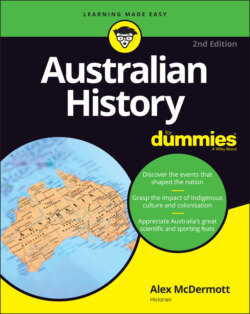Читать книгу Australian History For Dummies - Alex McDermott - Страница 15
Welcoming in male suffrage
ОглавлениеDemocracy was another accidental by-product of the gold rushes — although, at this stage, for ‘democracy’ read ‘votes for most men’. The Australian colonies were some of the very first places anywhere in the world to grant practically universal male suffrage (voting rights). (And, 40 to 50 years later, Australia would be one of the very first places to give votes to almost all women.)
The granting of the right to vote to most men in the 1850s was one of those sublimely unexpected twists in Australian history. In Britain at the time, constraints were placed on who qualified for the franchise (that is, who was allowed to vote). Traditionally, those who owned large amounts of property or paid big amounts of rental qualified to vote. When Australian colonies were granted elected Legislative Councils, constraints similar to those operating in Britain were put in place. But what members of the British parliament didn’t know was that rents were much, much higher in Australian cities. Thanks to gold, everything had shot up — prices, wages, rents, the lot. Without realising it, the British parliament had set constraints that allowed a much higher proportion of men to vote than in Britain. So, without great agitation or publicity campaigns or fanfare, practically all men got the right to vote in elections that formed the colonial governments. Politicians changed their pitch and their promises accordingly. (See Chapter 8 for some of the initial political effects of the more universal male suffrage.)
Even after winning the vote, it seemed that many people in the colonies didn’t really care about politics. They hadn’t come here to vote, after all. They’d come here to get rich. And the ‘native-born’ white settler Australians were notoriously unconcerned about political life. Many newly arrived British immigrants were veterans of the great political struggles of 1840s Britain. They complained that all the locals seemed to care about (and here you’d better brace yourself for a bit of a shock) was making money, getting drunk, racing horses and playing sport. How un-Australian can you get?! Wait, better not answer that … (See Chapters 8 and 10 for more on how new immigrants in the 1840s and 1850s influenced colonial politics.)
So it turns out plenty of defining Australian characteristics were embedded in the culture of the place from very early on. What many people in the colonies wanted most tended to be plenty of leisure time to do with as they saw fit (see the sidebar ‘The great Australian leisure time experiment’).
